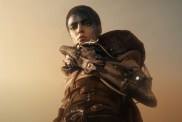Legendary German New Wave filmmaker Werner Herzog discusses his latest fever dream Salt and Fire
74-year-old German filmmaker and cult icon Werner Herzog’s (Nosferatu: Phantom Der Nacht) latest film, the surreal Salt and Fire opens today in theaters via XLrator Media (the film is already on VOD).
The haunting, bizarre and challenging (and often, rather funny) film stars Michael Shannon (Boardwalk Empire and Herzog’s eerie David Lynch collaboration My Son, My Son, What Have Ye Done), German actress Veronica Ferres (Hector and the Search for Happiness), and Gael Garcia Bernal (Mozart in the Jungle) and is written and directed by Herzog, adapted from a very short story by Tom Bissell. Ferres is mesmerizing as a corporate CEO who is kidnapped by an eco-terrorist (Shannon) and left stranded with two blind children in a desolate landscape, a former body of water that has — due to environmental havoc — turned into a solid, endless desert of salt that is burning from within.
RELATED: Read our review of Salt and Fire
Like all of Herzog’s work, Salt and Fire celebrates the natural world and examines the plights of the often dangerous humans who dare to try to tame it. His movies are personal and yet epic, melancholy and yet absurdly funny, dark and psychological and yet almost child-like in their curiosity. These dichotomous sensibilities are what make his movies so beloved and often divisive.
We had the honor of speaking with Herzog recently about Salt and Fire.
ComingSoon.net: Salt and Fire is a Werner Herzog film. And yet initially there was a struggle to sell it as a genre movie. It was dubbed an “eco thriller” which I guess it is, but yet, it’s more. Did that frustrate you?
Werner Herzog: Well, yes in a way, yes because that was such a stupid labeling. But it’s hopeless to talk against it. It doesn’t matter. The film is what it is. It’s in a way completely fresh and new for me although it has the same worldview and the same pulse as my other films have.
CS: How faithful was it to the original story on which its based?
Herzog: You should read the story. it’s only 25 or 30 pages. It’s basically just a mysterious hostage set up and the woman who is leading a small delegation is deliberately stranded in the desert with two blind boys, so that’s all there is. All the rest is my invention. Originally there was a plan to shoot it in this gigantic dried out lake in central Asia but that didn’t look so interesting to me. So I decided to look somewhere else and came across the salt flats in Bolivia very quickly.

CS: The two little blind boys in the film are remarkable non-actors. How long did it take to find them?
Herzog: I found them right away. They were the first ones we saw. I knew that was it. But since we had prepared other meetings with other blind boy siblings, we saw them all. But none of them were even close to the very first ones I had seen. And I had a very, very fine rapport with them.
CS: You really feel a connection between the boys and Veronica too. Did she connect with them?
Herzog: Yes, she did and that really signals that there’s a great actress at work. She doesn’t speak the language the boys are speaking. She was put into a landscape she’s never been in before and she fills it completely with light and warmth and motherliness and introspection. So I always knew she was someone of great class and someone not yet completely discovered yet by even German filmmakers.
CS: But she is a superstar in Germany, correct?
Herzog: Sure, yes, yes. But there’s more about her than you’ve ever seen before. I do have an eye for that.
CS: You do. And you have an eye for drawing the best out of performers while placing them in raw, animalistic environments. Did you take Michael and Veronica to the flats prior to shooting?
Herzog: No, no. We just went there and did our shooting. There were some unfortunate things happening during the shoot, for example Veronica’s father passed away just days before we started production so she would arrive late and we lost a few days so I had to be very focused and condensed with everything which, in a way, did very good for the film. It was completely focused.
CS: Employing nature in your work, do you find making your documentary films helps you when making a narrative feature?
Herzog: Well, I wouldn’t say it like that. Because I’ve never made a documentary. Those are all just feature films in disguise, let’s put it that way; It’s just all movies.
CS: And you have used Peter Zeitlinger as your DP in virtually of your films since 1995…
Herzog: Peter is exceptional and I have always loved the kind of clarity he has. And you can see it in the way the camera flows in choreography to the landscape. But in each film he’s quite different. He knows how to adapt the camera to the climate of a different story.

CS: And you know how to take those images and use music in the edit to transform them. Ernst Reijseger‘s score in Salt and Fire is haunting…
Herzog: Yes, It’s also of exceptional, strange beauty and it corresponds with this extraterrestrial landscape. He’s a great composer and the most remarkable pieces in this movie are him playing the cello along with five Slovenian shepherds, who sing this very almost prehistoric sounding Slovenian folklore music. And it gives the environment a totally strange beauty. I told him that you have to create space with the music and he understood it.
CS: It always feels in your movies as if your characters are actually listening to nature. They stop. They contemplate in silence. Is this by design?
Herzog: No… but I think that observation is very good. I’ve never heard this before. Actually, in the film there’s a moment where the two blind boys press their ears to the salt on the ground and listen to rumbling of a distant volcano and Veronica does the same. It’s listening to the pulse within the earth itself…
CS: …and becoming almost symbiotic with it. There’s that great moment in Nosferatu where Klaus Kinski is tilting his head like he’s hearing a transmission in the world that only he can tune into. It’s very beautiful and I see it in all your work.
Herzog: Yes, yes, that’s true.
CS: You’ve never employed big special effects and certainly no digital trickery in your films. Maybe in Rescue Dawn, I’m not sure. But I don’t think you have…
Herzog: That’s correct. I am more interested in real landscapes that transform into something magical, natural. It’s not for the sake of realism that I go to these landscapes. I create something that only occurs in fever dreams and only occurs in our sense of magic.
CS: It’s crazy that your earlier film Queen of the Desert is opening next week, just days after Salt and Fire.
Herzog: Yes, well that film should have been out a year and a half ago but these things happen. There’s a glitch between the producer and the distributor. But so what, you take it as it comes.
CS: And last year in Toronto, Salt and Fire was being junketed at the same time as Into the Inferno. Do you get confused doing interviews when this happens?
Herzog: No, it’s okay. That’s part of the job, That’s what I do and I never complain. I’m not in the culture of complaints.
(Photo Credit: Getty Images)









